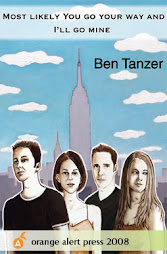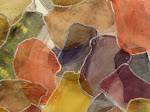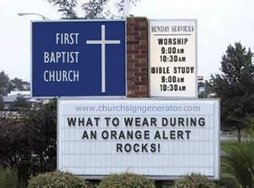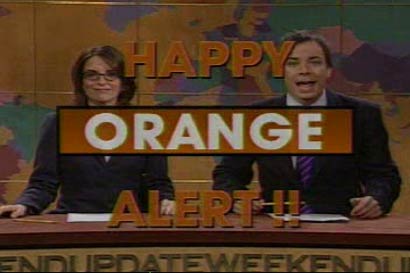
Mary Hamilton
In a city filled with writer's there has to be plenty of stages. This is where a writer can try out new pieces, and get instant reactions and feedback. Who better to set that stage but a fellow writer. They know how to let the reader to get the full experience. One of the more original series in town is called Quickies, and it is co-hosted by Mary Hamilton and Lindsay Hunter. What makes the series unique is its rapid pace brought on by time restraints and size of the pieces. It is a different type of challenge for the reader and that is what makes it so exciting. Aside from her work with Quickies, Mary Hamilton's work has appeared at Thieves Jargon, decomP, Pindeldyboz, Word Riot, and many more journals. She writes with wit, humor, and a rhythm all her own. She is a strong advocate for Chicago's literary scene, and always wears the most fashionable glasses since she is an optician at Eye Spy Optical.
Recently, she was kind enough to answer a few of our questions.
Orange Alert (OA): So how did the idea of Quickies come about? Are you happy with how the series is going?
Mary Hamilton (MH): The series is great! It's beyond all expectations.
We're pulling together our AWP Spectacular! right now. The readers are all booked and it's blowing my mind just thinking of hearing all of these amazing writers in one night. We always book a few months in advance. Even though my focus is on February, part of my brain is thinking about April. So thinking about the future of Quickies! is pretty invigorating.
Quickies! came about when my co-host and co-founder, Lindsay Hunter and I found ourselves really bored at readings. Not that we didn't love the authors, but I know I have a really short attention span and, as good as the work was, I was bored. So we set a time limit and got victims (er...readers) to join us. We also wanted a showcase for the beauty of very short fiction (I was really annoyed by so many people thinking short shorts were either practice for longer work or a sign of being a lazy writer). And, to be honest, we needed to practice reading out loud.
OA: As a co-founder of a reading series, what is your opinion of the lit scene in Chicago? Is Chicago a good place to be a writer, or does it really matter where you live?
MH: Chicago is an amazing city to be a writer. Not only is the lit scene here really strong and active, but there are so many other sources of inspiration in this city, it blows my mind. But lit scene, yes, very active and, most importantly, extremely supportive. In January alone I think I have 8 readings to attend in my calendar, and two more that I'll be missing because they've been booked on the same night as other readings!
OA: I've heard that some publishers strongly recommend that their writer's maintain a blog. Do you feel that blogging has become an important part of being a successful writer?
MH: I have a blog. I update it about twice a month, but I do enjoy the blogs of other writers and I wish I blogged more. I also think a blog is a fantastic place for a writer to make their work available, especially those of us who publish mainly online. It's a great one-stop resource to find expanded work. In my opinion, the point of writing stories is for people to read them, so why not tell the people where to find your work? Right?
OA: You have been published both in print and on-line, do you feel that one is more legitimate than the other?
MH: To be honest, legitimate is a gross word. My print work was back when I wrote music reviews and the print was freely distributed in urine-scented train stations so it may have really been less "legitimate" than my online work.
I think online journals are a place where writers can be free to experiment and where a huge population of readers can find work. Not all bookstores carry all lit journals but pretty much every Internet goes to the lit websites. This essay by Jason Sanford spells it out pretty well.
OA: Do see the Quickies reading series doing anything in print, an anthology perhaps?
MH: Maybe....
OA: What's next for Mary Hamilton?
MH: Well, I was just noticing that my inbox hasn't had a rejection in a while and then I realized that I don't have anything in the submission process so I guess I'll hunker down and send some work to the wolves. Other than that, I'm trying to pull together a couple of chapbooks (one is dedicated to Theodore Huxtable and the other is a long palindrome) and working on Quickies! which is constant work. I am also going to bake some bread after finishing this email.
Bonus Questions:
OA: If you could sit down to coffee with any other than Theodore Huxtable who would it be?
MH: I have several friends in many corners of the world, so I would like to get them all together for a big group hug. But let's talk famous people: I am sure that if we ever met in real life, Mos Def would realize that he loves me and so I would have to say Mos Def.
OA: What type of music do you enjoy and who are a few of your favorites?
MH: This is a dangerous question. It's like asking me to choose my favorite child.
I am going to make a list:
The Frames, Tricky, Josh Ritter, Girl Talk, Belly, Morrissey, Harry Nilsson, lovers, France Gall, Dr. Dog, Miles Benjamin Anthony Robinson, Dresden Dolls, Eric B. and Rakim, George Harrison (my favorite Beatle), Jason Anderson, King Khan, Prince, Mason Jennings, T.Rex, Mos Def, Say Hi to Your Mom, Akron Family, Big Digits, and Mic Christopher, Ted Hawkins and old Weezer stuff. I'm also not ashamed to say that I love pop music, bad radio-friendly pop music, so very much. My favorite band/musician at the moment is Soltero.
Orange Alert (OA): So how did the idea of Quickies come about? Are you happy with how the series is going?
Mary Hamilton (MH): The series is great! It's beyond all expectations.
We're pulling together our AWP Spectacular! right now. The readers are all booked and it's blowing my mind just thinking of hearing all of these amazing writers in one night. We always book a few months in advance. Even though my focus is on February, part of my brain is thinking about April. So thinking about the future of Quickies! is pretty invigorating.
Quickies! came about when my co-host and co-founder, Lindsay Hunter and I found ourselves really bored at readings. Not that we didn't love the authors, but I know I have a really short attention span and, as good as the work was, I was bored. So we set a time limit and got victims (er...readers) to join us. We also wanted a showcase for the beauty of very short fiction (I was really annoyed by so many people thinking short shorts were either practice for longer work or a sign of being a lazy writer). And, to be honest, we needed to practice reading out loud.
OA: As a co-founder of a reading series, what is your opinion of the lit scene in Chicago? Is Chicago a good place to be a writer, or does it really matter where you live?
MH: Chicago is an amazing city to be a writer. Not only is the lit scene here really strong and active, but there are so many other sources of inspiration in this city, it blows my mind. But lit scene, yes, very active and, most importantly, extremely supportive. In January alone I think I have 8 readings to attend in my calendar, and two more that I'll be missing because they've been booked on the same night as other readings!
OA: I've heard that some publishers strongly recommend that their writer's maintain a blog. Do you feel that blogging has become an important part of being a successful writer?
MH: I have a blog. I update it about twice a month, but I do enjoy the blogs of other writers and I wish I blogged more. I also think a blog is a fantastic place for a writer to make their work available, especially those of us who publish mainly online. It's a great one-stop resource to find expanded work. In my opinion, the point of writing stories is for people to read them, so why not tell the people where to find your work? Right?
OA: You have been published both in print and on-line, do you feel that one is more legitimate than the other?
MH: To be honest, legitimate is a gross word. My print work was back when I wrote music reviews and the print was freely distributed in urine-scented train stations so it may have really been less "legitimate" than my online work.
I think online journals are a place where writers can be free to experiment and where a huge population of readers can find work. Not all bookstores carry all lit journals but pretty much every Internet goes to the lit websites. This essay by Jason Sanford spells it out pretty well.
OA: Do see the Quickies reading series doing anything in print, an anthology perhaps?
MH: Maybe....
OA: What's next for Mary Hamilton?
MH: Well, I was just noticing that my inbox hasn't had a rejection in a while and then I realized that I don't have anything in the submission process so I guess I'll hunker down and send some work to the wolves. Other than that, I'm trying to pull together a couple of chapbooks (one is dedicated to Theodore Huxtable and the other is a long palindrome) and working on Quickies! which is constant work. I am also going to bake some bread after finishing this email.
Bonus Questions:
OA: If you could sit down to coffee with any other than Theodore Huxtable who would it be?
MH: I have several friends in many corners of the world, so I would like to get them all together for a big group hug. But let's talk famous people: I am sure that if we ever met in real life, Mos Def would realize that he loves me and so I would have to say Mos Def.
OA: What type of music do you enjoy and who are a few of your favorites?
MH: This is a dangerous question. It's like asking me to choose my favorite child.
I am going to make a list:
The Frames, Tricky, Josh Ritter, Girl Talk, Belly, Morrissey, Harry Nilsson, lovers, France Gall, Dr. Dog, Miles Benjamin Anthony Robinson, Dresden Dolls, Eric B. and Rakim, George Harrison (my favorite Beatle), Jason Anderson, King Khan, Prince, Mason Jennings, T.Rex, Mos Def, Say Hi to Your Mom, Akron Family, Big Digits, and Mic Christopher, Ted Hawkins and old Weezer stuff. I'm also not ashamed to say that I love pop music, bad radio-friendly pop music, so very much. My favorite band/musician at the moment is Soltero.
For more information on Mary Hamilton you can visit her blog.
+by+Nick+Volkert).jpg)
































